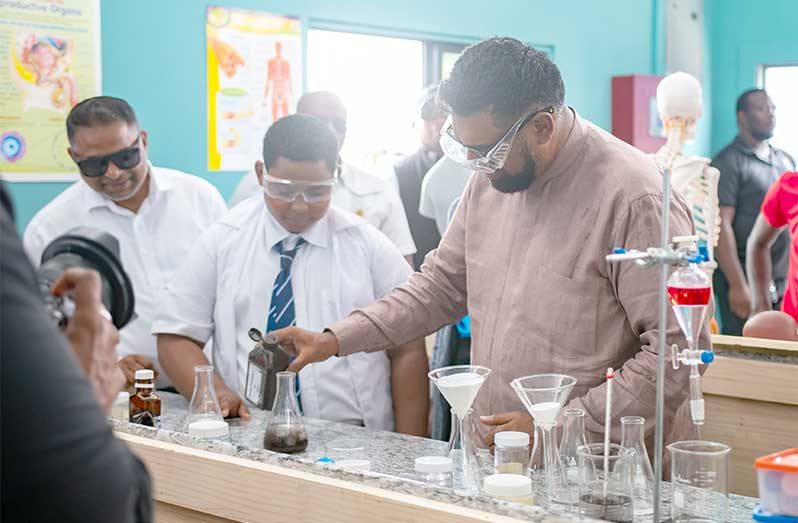– President Ali affirms, commissions modern Tuschen Secondary School to further boost education delivery
PRESIDENT Dr. Irfaan Ali has hailed the commissioning of the $930 million Tuschen Secondary School as a transformative moment for Region Three and the nation, calling the state-of-the-art facility a “foundation of the new Guyana.”
Addressing a gathering at the new school Wednesday, President Ali said that the new infrastructure was not simply just a building but a new beginning for families and many children, which marks a significant step in providing equal access to quality education across the country.
“Today is about new opportunities here in Tuschen and in Region Three, adding to your regional asset, a piece of infrastructure that is second to none in our country,” the president declared.
The new institution, he emphasised, is not a half-measure but a world-class facility capable of holding its own among the best. “We are delivering to the people of Region Three a school that can match any other such school in the entire CELAC region—that is, the entire Latin America region,” Dr. Ali stated.
The President outlined a broader vision for education in Guyana, asserting that every child must have not only access to a secondary school but also a viable pathway to a successful future, whether technical, academic, or artistic.
“We want every single child of our country, of our future, not to just have a secondary school, but to have a viable pathway for a successful future… We are going to support that viable future of our children,” he said.
Dr. Ali underscored that education is not just another government initiative but the cornerstone of national development.
“Education is the single most important foundation upon which the future of our country will be built,” he declared. “When we build this school, we are not simply erecting another centre of learning. No, we are laying the foundation of the new Guyana.”
He posed a powerful rhetorical question to underscore the role of human capital in national progress: “What sense will it make to have oil, gold, and agriculture but not have the people trained to manage it? What sense will it make to have all of the natural resources but not have the scientists, the engineers, or the economists to multiply this value?”
Linking the investment in education to a broader developmental vision, the president said Guyana must become part of a new global frontier, one driven by knowledge and innovation.
“Education is a bridge from poverty to prosperity. It is the passport from struggles to success. It is a revolution that transforms a people from surviving to thriving,” he told the gathering.
The President also noted the government’s continued expansion of the national school feeding programme and reaffirmed the administration’s commitment to supporting teachers.
“When every child can dream, a nation can rise,” he said. “Let’s face it, without teachers, there is no education. Without teachers, these walls will be empty shells and my brothers and sisters, we are not stopping here.”
Echoing the President’s sentiments, Minister of Education, Priya Manickchand, declared that by September 2026, every child in Guyana will have access to a secondary school.
“By September 2026, all over this country, children will be able to go to a high school to get a sound secondary education,” the Minister stated.
She noted that the government has aggressively pursued the building out of an equitable education sector, ensuring access to secondary education is available, especially in areas where it was previously inadequate.
“In three and a half years, the government built 67 nursery schools and 45 primary schools across Guyana. We have built or are building 42 secondary schools,” Manickchand reported.
Highlighting the scale of development in Region Three, she added, “We have never had universal secondary education here in Region Three… From then to now, we have completed the Westminster Secondary and the De Willem Secondary. By next year, Crane Secondary will be finished. That’s five secondary schools in your region alone for your children.”
The Tuschen Secondary School will serve as a central hub for hundreds of students in region three and marks another step toward achieving universal access to quality education, a core pillar of the government’s development agenda.


.jpg)











